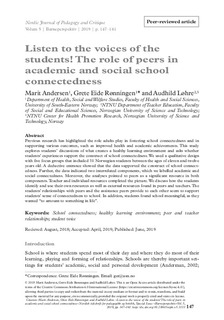Listen to the voices of the students! The role of peers in academic and social school connectedness
Journal article, Peer reviewed
Published version
Permanent lenke
http://hdl.handle.net/11250/2628511Utgivelsesdato
2019Metadata
Vis full innførselSamlinger
Sammendrag
Previous literature has highlighted the role that adults play in fostering school connectedness and in supporting various outcomes, such as improved health and academic achievement. This study explores students’ discussions of what creates a healthy learning environment and asks whether students’ experiences support the concept of school connectedness. We used a qualitative design with five focus groups that included 31 Norwegian students aged 11–12. A deductive entrance showed that the data supported the concept of school connectedness. Further, the data indicated two interrelated components, which we labelled academic and social connectedness. Moreover, inductive analyses pointed to peers as a significant resource in both components. Teacher and individual resources completed the picture. In light of Antonovsky, we discuss how the students identify and use their own resources as well as external resources found in peers and teachers. The students’ relationships with peers as well as the assistance peers provide to each other seem to support students’ comprehension and management of daily school life, and above all, the students found school meaningful, as they wanted to amount to something in life. However, future studies should more thoroughly explore the role of peers in school connectedness.
Beskrivelse
This is an Open Access article distributed under the terms of the Creative Commons Attribution 4.0 International License allowing third parties to copy and redistribute the material in any medium or format and to remix, transform, and build upon the material for any purpose, even commercially, provided the original work is properly cited and states its license.

